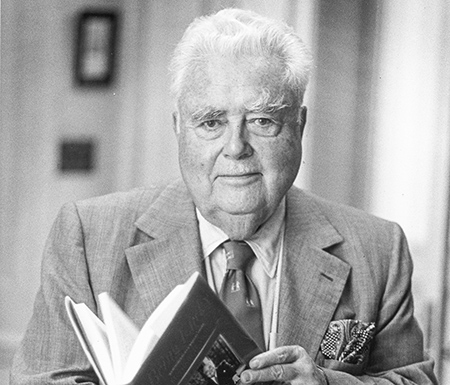Subscriber Benefit
As a subscriber you can listen to articles at work, in the car, or while you work out. Subscribe NowIf there is a single individual to whom the excellence of Indiana University can be credited, that person is Herman B Wells. Born in Jamestown in 1902, Wells attended IU as a student, where he devoted more time to the band and his fraternity than to his studies.
Having earned both bachelor’s and master’s degrees in business at IU, Wells opted not to pursue a doctorate in economics, instead accepting a job with the Indiana Bankers Association that took him to every one of Indiana’s 92 counties.
Wells joined IU’s economics faculty in 1930. Just five years later, he became dean of the business school. Two years after that, he was named interim president, and then president of the university at the age of 35. He served in this capacity until 1962, when he was appointed chancellor.
Recognizing that a university can be only as good as its faculty, Wells immediately turned his attention to recruiting. During his year as interim president, he is said to have traveled over 33,000 miles and interviewed 190 faculty candidates.
Wells sought to internationalize IU, strongly supporting education in foreign languages and cultures. Yet he never forgot that IU is Indiana’s University. He once said that, in order to realize its full potential, IU must keep its eye on Birdseye and Bangkok as well as Bloomington.
Wells characterized his approach to university administration in these terms: “Administration must be the servant, not the master, of the academic community. It is not an end unto itself. It follows, therefore, that generally the least administration is best.”
As president and later chancellor, Wells was highly visible and unpretentious. He strolled regularly across campus and frequently engaged students in conversation. He also held weekly office hours, during which any student could come speak with him.
Wells regarded the environment of the university highly. While increasing the campus’s footprint tenfold, he made sure it retained its natural beauty, saying, “To cut down a tree unnecessarily is an act of treason against our heritage.”
Wells demonstrated on many occasions that he put principle above political expediency. When IU professor Alfred Kinsey came under fire for his studies on human sexuality, Wells strongly supported his work on the grounds of academic freedom.
Looking back on his defense of Kinsey, Wells wrote, “It reinforced the faculty’s sense of freedom to carry out work without fear of interference, and it established in the public mind that the university had an integrity that could not be bought, pressured, or subverted.”
When Bloomington barbers and restaurants refused to serve black students, Wells informed the proprietors that if blacks could not use their facilities, no IU students would be allowed to do so. Desegregation quickly followed.
A man of action, Wells could inspire action in others, too. Faced with a segregated campus swimming pool, Wells one day told black football player J.C. Coffee to go jump in the pool. No crisis ensued, and the pool was permanently desegregated.
Wells was so dedicated to the university’s students that he personally signed every diploma awarded during his 25-year tenure, a total of 62,621 sheepskins. Explaining his dedication, Wells said, “In the act of signing, I felt some of the joy and satisfaction of each graduate.”
By the time Wells died in 2000 at the age of 97, he had clearly lived up to one of his favorite Chinese proverbs: “If you are planning a year ahead, sow rice. For 10 years, plant trees. For a hundred years, educate people.”•
__________
Hoosier Beacons pays tribute to Indiana’s bicentennial by telling the stories of famous Hoosiers. It appears every other week. Gunderman is chancellor’s professor at Indiana University.
Please enable JavaScript to view this content.

